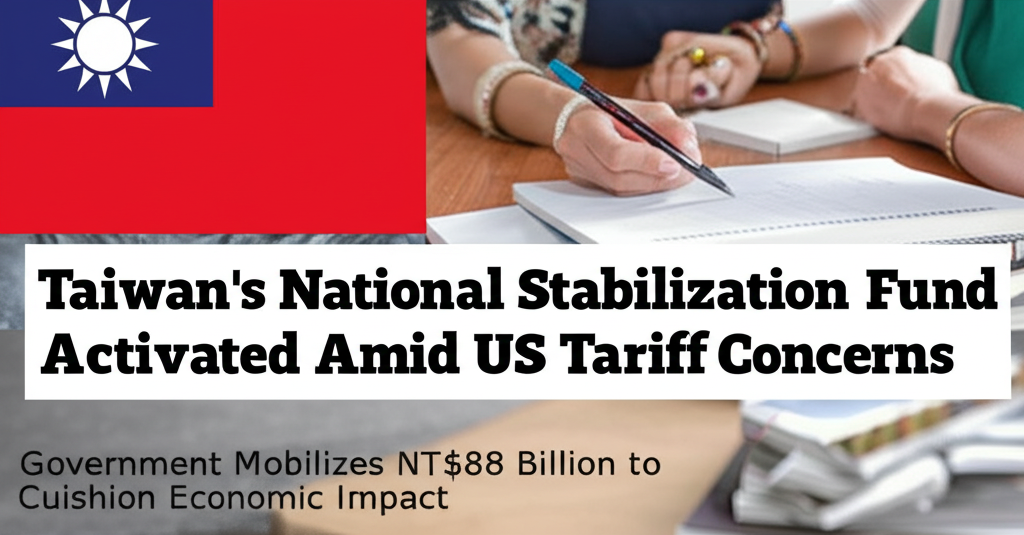Taiwan's National Stabilization Fund Activated Amid US Tariff Concerns
Government Mobilizes NT$88 Billion to Cushion Economic Impact

In a move to bolster its economy, Taiwan's National Stabilization Fund (NSF) has been activated for the ninth time in the nation's history. This decision comes in response to market volatility triggered by the US government's announcement of 32 percent tariffs on Taiwan, as confirmed by US President Donald Trump.
The NSF board, convened earlier than initially planned, voted to support the stock market using the NT$500 billion (US$15.15 billion) fund. Funding injections are scheduled to begin imminently.
President William Lai (賴清德) on Sunday announced that Taiwan has no intention of retaliating against the 32 percent tariffs. The government plans to spend NT$70 billion on initiatives such as lowering loan interest rates, reducing administrative costs, and expanding tax exemptions to support industries affected by the US tariffs. Furthermore, the government will aid enterprises in diversifying their markets and investing in research and development. An additional NT$18 billion will be allocated to the agricultural sector through loans, interest subsidies, and equipment subsidies.
Minister of Foreign Affairs Lin Chia-lung (林佳龍) stated that Taiwan is prepared to negotiate with the US on the tariff issue at any time. He emphasized that Taiwan is ready to discuss a range of topics, including investment in and purchases from the US, and non-tariff barriers. White House economic advisor Kevin Hassett confirmed that Taiwan had reached out to discuss the tariffs, and Premier Cho Jung-tai (卓榮泰) stated that the government would choose an appropriate time to present Lai’s plans to the US.
The TAIEX, experiencing its worst fall on Monday, further declined by 4.02 percent yesterday, reaching its lowest level in 14 months. Despite the significant market drop, the government, according to Cho, was prepared. The Executive Yuan, the Financial Supervisory Commission, and the central bank have undertaken comprehensive analysis of various scenarios. Cho also acknowledged the helpfulness of the temporary response measures announced by the commission and the Taiwan Stock Exchange on Sunday in maintaining market stability.
The American Chamber of Commerce in Taiwan expressed its concern about the tariffs and urged Washington to exempt Taiwan from trade actions that could potentially damage the US-Taiwan relationship.
Other Versions
El Fondo Nacional de Estabilización de Taiwán se activa ante la preocupación por los aranceles de EE.UU.
Le fonds national de stabilisation de Taïwan est activé en raison des inquiétudes concernant les droits de douane américains
Dana Stabilisasi Nasional Taiwan Diaktifkan di Tengah Kekhawatiran Tarif AS
Attivato il Fondo di stabilizzazione nazionale di Taiwan tra le preoccupazioni degli Stati Uniti in materia di dazi.
台湾の国家安定化基金が米国の関税懸念の中で活性化
미국의 관세 우려로 대만의 국가 안정화 기금이 활성화되었습니다.
Binuksan ang Pambansang Stabilization Fund ng Taiwan sa Gitna ng mga Alalahanin sa Taripa ng US
Национальный стабилизационный фонд Тайваня активирован на фоне опасений по поводу тарифов США
กองทุนเสถียรภาพแห่งชาติของไต้หวันเปิดใช้งาน ท่ามกลางความกังวลเรื่องภาษีนำเข้าของสหรัฐ�
Quỹ Ổn định Quốc gia Đài Loan Kích hoạt trong bối cảnh Lo ngại về Thuế quan của Mỹ
